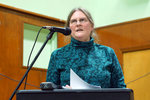A long-planned resort at Black Point would either be a boon to Brinnon's economy or the bane of its natural beauty and bucolic way of life, according to area residents and interested …
This item is available in full to subscribers.
We have recently launched a new and improved website. To continue reading, you will need to either log into your subscriber account, or purchase a new subscription.
If you had an active account on our previous website, then you have an account here. Simply reset your password to regain access to your account.
If you did not have an account on our previous website, but are a current print subscriber, click here to set up your website account.
Otherwise, click here to view your options for subscribing.
* Having trouble? Call our circulation department at 360-385-2900, or email our support.
Please log in to continue |
|




A long-planned resort at Black Point would either be a boon to Brinnon's economy or the bane of its natural beauty and bucolic way of life, according to area residents and interested organizations.
“Most, if not all, of us moved to this area because we like the rural, not citified area,” Kathrine Bringham of Brinnon told nine Jefferson County planning commissioners and more than 130 people during a public hearing Jan. 6 in the Brinnon Elementary School gym. “We knew when we moved here that services were at a distance. We knew we weren't going to have a five-star restaurant here. We knew there was no medical here. We knew we had to drive a distance. If you want to live by a resort, go live by one that's already there. Don't bring one here and screw it up for those of us who want the nice, quiet rural area.”
Of the 32 people who stepped up to speak, roughly half expressed support while the other half were generally opposed.
“We have no economy here,” business owner Joe Baisch of Brinnon said. “Those of you who are retired make up the bulk of the income in this economy, that is one generation long. We have a plethora of young people who have mortgaged themselves with student loans following behind us. We have to find some courage and create an economy here.”
As for the issues – traffic, water, jobs, public services and environmental pollution, to name a key few – the nature of most comments remained the same as those made during past public hearings.
For those who missed the hearing on the county's final supplemental environmental impact statement (FSEIS), written comments may be submitted through Feb. 3, when the county's planning commission meets at the Tri-Area Community Center in Chimacum.
The commission is charged with reviewing and recommending development regulations, which are specific to this resort, to the county's board of commissioners. That work is set for the commission's February meeting.
Written comments should be sent to David Wayne Johnson, the county's associate planner, at 621 Sheridan St. in Port Townsend or by email at dwjohnson@co.jefferson.wa.us.
CURRENT PROPOSAL
The now 10-year-old resort proposal would be located 2 miles south of Brinnon on 231 acres at Black Point next to the existing Pleasant Harbor Marina, which saw some $22 million in improvements last year.
“We did that so we could give you an idea of what to expect,” Garth Mann, president of the Alberta, Canada, company Statesman Group, said during a presentation Jan. 6. “We knew when we built it that we wouldn't make money, but we had to get out there and make something happen. That was not done through the usual permitting process. We got it built so we could show you, the community, what it is you can expect as far as the quality of the product that's being planned for what we call the Pleasant Harbor Resort.”
County planners on Dec. 9 released the FSEIS. They had released a draft of that environmental review in November 2014, and a December hearing on the draft drew 45 people to the Brinnon Community Center and garnered about 80 written comments.
“Based upon those comments, we did change the draft,” said Johnson, the county's lead planner for the resort project.
The final environmental review offers a new, scaled down option preferred by Statesman Group, which first applied in January 2006.
That option includes a 9-hole golf course with an associated 3-hole practice course requiring 1 million cubic yards of earthwork for grading, 890 residential units, 56,608 square feet of commercial space with resort-related amenities and 103 acres of natural area preserved.
Mann said his company completed a required study in 2015 of the area's economy and demographics.
“Unfortunately, our population in the Brinnon community is declining,” he said, pointing out that some 491 people live within a five minute drive. “The median household income in this area is the lowest in Washington state at roughly $39,000 per year in 2015.
“You can see that without a change and without jobs being created, the county will fade off into the sunset,” Mann said. “We've been involved in a lot of developments throughout the years in areas that have negative growth. Negative growth, as you can imagine, is not a positive thing for a community. It will affect the character of your community, if it's not in a progressive state of growth.”
Johnson said the State Environmental Protection Act (SEPA) process has succeeded in paring down Mann's proposal over the years.
“To me, SEPA really works because the intent behind it is to reduce the environmental impact of a project and you can see this happened over time with these alternatives,” he said. “It gradually lowered the environmental impact of the project and I think we got a really good project, a much better project than the one that was proposed in 2007.”
PUBLIC COMMENTS
Job creation and the resort's impact on the environment were key concerns at the Jan. 6 hearing, with representatives of the Sierra Club's North Olympic Group, the Hood Canal Environmental Council, the Brinnon Group, the Port Gamble S'Klallam Tribe and the Friends of Miller Peninsula State Park, among others, raising environmental concerns and calling for more time to review the FSEIS.
“We would join with the tribal representative in asking for a longer time to digest the material to make more meaningful comment,” Phil Best of Hood Canal Environmental Council said. “One of the biggest areas of concern right now for Puget Sound generally, including Hood Canal, is the stormwater runoff and the non-point pollution that is poisoning our waters.”
Brinnon-area residents themselves were split, though many said the resort would boost the area's economic viability and provide jobs.
“Without the resort and the marina itself, I would have to travel out of this area, I would have to move,” Pleasant Harbor Marina employee Samantha Boling, 28, of Brinnon said. “I don't want to. I have lived here my entire life. Garth Mann has put so much heart and soul into his dream, into his vision, and I truly hope it comes true because without this kind of growth in our area, there won't be any young people here to work.”
Britney Edwards of Brinnon said her three children could benefit from more organized, recreational opportunities in the area, such as a swimming pool.
“When my children get older, they will need a place to work, even seasonally,” she said. “They will need a place to recreate with their friends. We love the idea of having more options.”
As a Taylor Shellfish employee, Joan Hendricks of Brinnon said she worries how removal of vegetation from land at Black Point combined with rain might affect downstream shellfish beds. She also questioned the issue of job creation.
“Where I work, we have to hire people from Port Ludlow, Port Townsend, Sequim because we aren't getting local people from this area that are applying,” she said. “I know other businesses in the area have had that problem, so if someone wants to work in this area, they can find a job.”
Scott Black of British Columbia, Canada, said he's been visiting Brinnon since he was a child and now owns a cabin on Duckabush Road.
“There was a similar resort that happened in my backyard when I was 14 and my mom got a job there, which is great,” he said. “It was a low-paying job, but it got us through. It ended up being a big retirement village. It scarred the view scape heavily. It gave people a place to live. It's helped the economy slightly, but it's really increased the carrying capacity of the environment a lot. I'm not sure if it was worth it. I come down here because I really like the environment here. I like the sleepiness. I like the green. I don't want it to grow, particularly, so much that we lose the green, we lose the fresh air and the clean water and the oysters.”
Christina Maloney of Brinnon said the county's earlier draft of the environmental review stated existing businesses would not be displaced.
“He [Mann] has since displaced two local business,” she said. “One of which is mine: Kayak Brinnon. He not only displaced my business but decided to compete with me, resulting in a 60 percent decrease to my family's income. I cannot speak for the other business owner who was displaced, but I can tell you she was forced to shut down and liquidate.”
Maloney also questioned the impact of roughly 2,000 more residents.
“Adding 2,000 people to our population will not be an insignificant impact to our lifestyle, as the EIS suggests,” she said. “And I won't even go into detail about living through 10 years of construction traffic.”
Dennis Schultz of the Port Townsend area said the county as a whole has been in decline for the past 20 years and needs something to boost the economy, especially in south county.
“We've seen growing, viable businesses leaving,” Schultz said. “We don't see new, major businesses coming in. The emphasis by our government officials is to create small, two- or three-man businesses, which cannot support the economy, cannot support this county.”
Barbara Moore-Lewis, whose Brinnon Group opposes the resort project, said the resort has been billed as an economic benefit to the county in lieu of its potential environmental impacts. She said the applicant should deposit money into an account shared with county officials to cover the costs of sheriff's deputies and other emergency responders. She also said the applicant should get a bond to cover any environmental damage over a 50-year period.
“That's to protect the taxpayers of the county and we think any responsible commission will include those,” she said.
Roger Myhre of Brinnon said without development, the area would remain stuck in the past.
“Here we have an opportunity to do something,” he said. “It may not be perfect, it may not be half as good as they think it's going to be. But we can't prevent development from trying. It's not 1850. You can't keep it like 1850.”